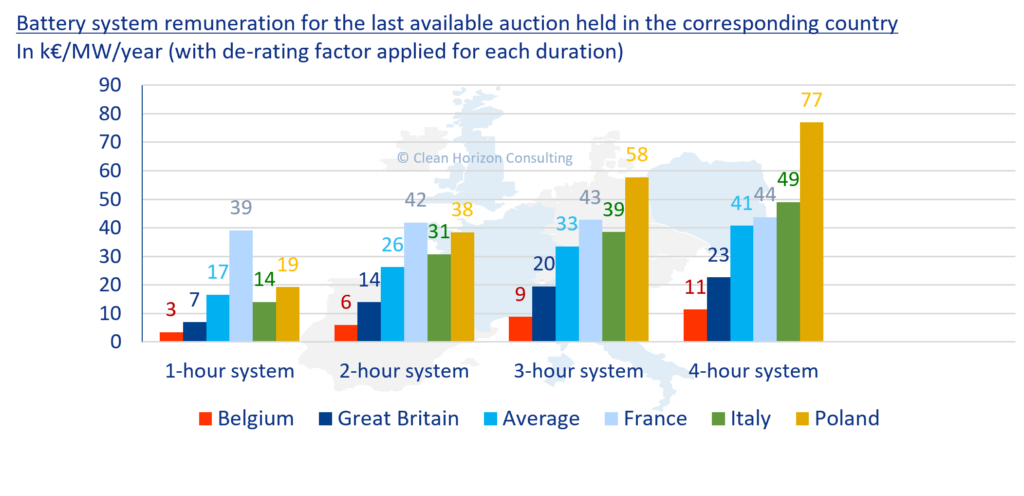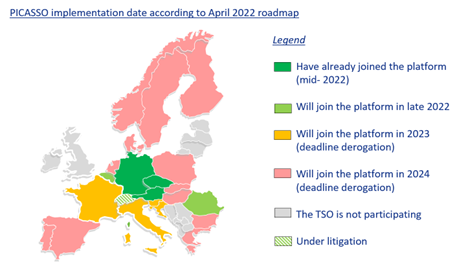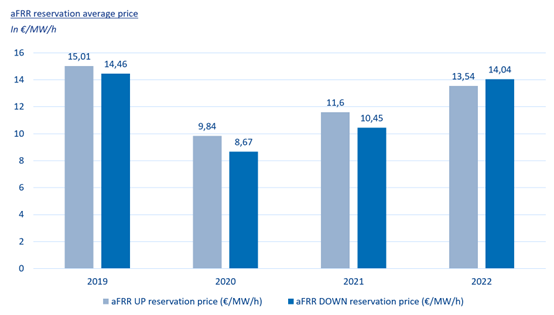
Energy networks in Europe are united in their common need for energy storage to enable decarbonisation of the system while maintaining integrity and reliability of supply. What that looks like from a market perspective is evolving, write Naim El Chami and Vitor Gialdi Carvalho, of Clean Horizon.
This is an extract of a feature which appeared in Vol.34 of PV Tech Power, Solar Media’s quarterly technical journal for the downstream solar industry. Every edition includes ‘Storage & Smart Power,’ a dedicated section contributed by the team at Energy-Storage.news.
Enjoy 12 months of exclusive analysis
- Regular insight and analysis of the industry’s biggest developments
- In-depth interviews with the industry’s leading figures
- Annual digital subscription to the PV Tech Power journal
- Discounts on Solar Media’s portfolio of events, in-person and virtual
New opportunities emerge to offer stable revenues as the need for storage in Europe is rampant
As markets in Europe gain in complexity and require extensive trading measures, some opportunities such as capacity auctions and storage-related tenders help ensure a “stable” revenue that supports financing decisions and mitigates market risks.
Capacity mechanisms help solve the missing money problem for generating assets while pushing towards energy decarbonisation
In order to support their decarbonisation efforts while maintaining adequate capacity thresholds to ensure power system security, diverse countries such as Italy, the United Kingdom and Poland (among many others) have created capacity mechanisms.
As most of the revenues for large generating assets operating in a liberalised market come from wholesale energy markets (often led under the pay-as-clear mechanism), expensive thermal peakers
are progressively being pushed out of the selection thresholds. As such, these assets risk going out of business due to the lack of sufficient revenues, jeopardising system security.
That is why capacity markets aim to solve this ‘missing money’ problem by providing revenues to new and existing generating capacity without interfering with the wholesale markets by ensuring:
• An additional revenue stream to wholesale revenues via a capacity payment (TSOs are not allowed to interfere with the energy markets)
• Visibility through long-term contracts for investors.
Among others, the Polish and Italian markets have been gaining remarkable interest from storage developers as they offer long-term capacity contracts for hefty annual payments, which eventually
supports final investment decisions in their project.
Renewable-plus-storage auctions as a means to accelerate the energy transition
Germany’s ‘Innovation Auctions’
In 2021, Germany’s Federal Network Agency (Bundesnetzagentur) launched Innovation Tenders that provide developers with fixed premiums on energy injected onto the grid for a period of 20 years to encourage renewable-plus-storage deployment throughout the country. This tender is set to occur on an annual basis with an expected procurement of 5,450MW of total capacity by 2028.
Under this process, battery storage systems must be charged from the renewable asset and need to have
the ability to provide aFRR (automatic Frequency Restoration Reserve) services (with no obligation to participate in aFRR).
Spanish Innovative Hybrid Tender for renewable-plus-storage projects
Eligible energy storage systems must be larger than 1MW or 1MWh with a minimum discharge duration of 2 hours. The storage-to-plant capacity ratio (in MW) must be larger than 40% and smaller than 100%. Selected entities will benefit from grants of up to €15 million per project and €37.5 million per company. The grant value will be assessed based on the company size, location and a series of evaluation criteria.

As energy storage systems become less expensive and competition grows, trading strategies gain in complexity
Until recently, energy storage systems in Europe relied on “traditional” revenues that were mostly reliant on frequency control services such as the Frequency Containment Reserve (FCR) in countries like France or Germany.
In some cases, arbitrage revenues were also considered as an additional revenue – even though their impact on project profitability has been somewhat limited over the past few years, especially before the start of the Russo-Ukrainian War and the tensions that hit the energy markets.
However, the ever-growing competition among market players has pushed towards more complex trading strategies that aim to capture a maximum of revenues – both existing and new.
The secondary reserve market: a new opportunity to storage systems
Frequency control reserves are crucial in order to maintain system stability by countering frequency drifts then restoring it to normal levels. Among these services is the automatic Frequency Restoration Reserve
(aFRR), which has witnessed an overhaul over the past few years under the ENTSOE’s PICASSO (Platform for the International Coordination of Automated Frequency Restoration and Stable System Operation) project.
Across Europe, 26 states have already expressed their interest in joining the PICASSO platform with each having its own timeline, presented in the image below. What follows is a look at the opening of the secondary reserve market in Europe, taking Germany’s example as a reference.

The aFRR provisioning is remunerated via two market mechanisms:
• Capacity reservation bids to reserve assets. Capacity reservation is not symmetrical,
meaning that two bids are possible for an energy storage system (upwards and downwards):
• Energy activation (UP and DOWN) bids in real time to remunerate the energy injected or withdrawn from the grid by the energy storage system.
At national level in Germany, each prequalified asset can submit a capacity reservation price (in € per MW per 4 hours) resulting in six daily products for up and down direction. The auction is pay as bid and selection is done in the merit order.

The figure to the left shows the yearly average for the aFRR reservation prices. Both revenue streams are stackable.
At the supra-national level, PICASSO enables TSOs to activate reserved assets in real time. This activation process follows a pay-as-clear method, meaning the assets are activated in the merit order and the marginal asset makes the price.
PICASSO has been quite volatile since its launch in May 2022, with average prices respectively of 100 €/MWh and 500 €/MWh for DOWN and UP aFRR activation.
Using PICASSO historical data and assuming a 2MW/4MWh battery operates with 1 cycle per day with a round trip efficiency of 85%, it could generate on PICASSO roughly 175 k€/MW/year on PICASSO only. (that should be added to the reservation payment).
This is an extract of a feature which appeared in Vol.34 of PV Tech Power, Solar Media’s quarterly technical journal for the downstream solar industry. Every edition includes ‘Storage & Smart Power,’ a dedicated section contributed by the team at Energy-Storage.news.
Cover image: A recently-completed solar-plus-storage project in Saxony, Germany, the subject of a winning bid in an Innovation Tender. Leipziger Stadtwerke.
About the Authors
Naim El Chami is Training Manager and Senior Energy Storage & Hydrogen Analyst at Clean Horizon. His main expertise covers market and regulatory analyses, techno-economical and financial assessment of energy storage and hydrogen systems as well as the management of GWh-scale procurements.
Vitor Gialdi Carvalho is an optimisation support and market analyst at Clean Horizon. He has participated in the sizing of energy storage projects in various regions including Africa, Europe, and the Middle East. Clean Horizon offers a wide variety of services spanning from market & regulatory analysis to technical consulting and project procurement.
This article has been amended from the originally published version to give more clarity over certain aspects of the aFFR ancillary service market.

